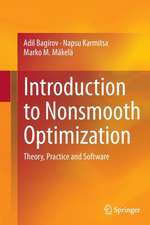Multicriteria Portfolio Construction with Python: Springer Optimization and Its Applications, cartea 163
Autor Elissaios Sarmas, Panos Xidonas, Haris Doukasen Limba Engleză Paperback – 18 oct 2021
This Work may also be considered as a reference which presents the state-of-art research on portfolio construction with multiple and complex investment objectives and constraints. The book consists of eight chapters. A brief introduction is provided in Chapter 1. The fundamental issues of modern portfolio theory are discussed in Chapter 2. In Chapter 3, the various multicriteria decision aid methods, either discrete or continuous, are concisely described. In Chapter 4, a comprehensive review of the published literature in the field of multicriteria portfolio management is considered. In Chapter 5, an integrated and original multicriteria portfolio construction methodology is developed. Chapter 6 presents the web-based information system, in which the suggested methodological framework has been implemented. In Chapter 7, the experimental application of the proposed methodology is discussed and in Chapter 8, the authors provide overall conclusions. The readership of the book aims to be a diverse group, including fund managers, risk managers, investment advisors, bankers, private investors, analytics scientists, operations researchers scientists, and computer engineers, to name just several. Portions of the book may be used as instructional for either advanced undergraduate or post-graduate courses in investment analysis, portfolio engineering, decision science, computer science, or financial engineering.
| Toate formatele și edițiile | Preț | Express |
|---|---|---|
| Paperback (1) | 776.09 lei 43-57 zile | |
| Springer International Publishing – 18 oct 2021 | 776.09 lei 43-57 zile | |
| Hardback (1) | 781.94 lei 43-57 zile | |
| Springer International Publishing – 18 oct 2020 | 781.94 lei 43-57 zile |
Din seria Springer Optimization and Its Applications
- 15%
 Preț: 642.00 lei
Preț: 642.00 lei - 15%
 Preț: 664.61 lei
Preț: 664.61 lei - 18%
 Preț: 961.55 lei
Preț: 961.55 lei - 17%
 Preț: 360.80 lei
Preț: 360.80 lei - 13%
 Preț: 458.09 lei
Preț: 458.09 lei -
 Preț: 336.80 lei
Preț: 336.80 lei - 18%
 Preț: 787.91 lei
Preț: 787.91 lei - 17%
 Preț: 397.79 lei
Preț: 397.79 lei - 23%
 Preț: 644.67 lei
Preț: 644.67 lei - 8%
 Preț: 337.38 lei
Preț: 337.38 lei - 18%
 Preț: 1133.30 lei
Preț: 1133.30 lei - 15%
 Preț: 646.43 lei
Preț: 646.43 lei - 15%
 Preț: 647.40 lei
Preț: 647.40 lei -
 Preț: 400.47 lei
Preț: 400.47 lei -
 Preț: 379.86 lei
Preț: 379.86 lei -
 Preț: 383.90 lei
Preț: 383.90 lei -
 Preț: 388.48 lei
Preț: 388.48 lei -
 Preț: 546.26 lei
Preț: 546.26 lei - 15%
 Preț: 647.40 lei
Preț: 647.40 lei -
 Preț: 390.25 lei
Preț: 390.25 lei - 15%
 Preț: 649.87 lei
Preț: 649.87 lei - 24%
 Preț: 611.56 lei
Preț: 611.56 lei - 18%
 Preț: 972.62 lei
Preț: 972.62 lei - 20%
 Preț: 585.92 lei
Preț: 585.92 lei - 15%
 Preț: 710.09 lei
Preț: 710.09 lei - 18%
 Preț: 742.61 lei
Preț: 742.61 lei - 15%
 Preț: 658.22 lei
Preț: 658.22 lei - 15%
 Preț: 659.02 lei
Preț: 659.02 lei - 18%
 Preț: 745.15 lei
Preț: 745.15 lei - 15%
 Preț: 705.34 lei
Preț: 705.34 lei
Preț: 776.09 lei
Preț vechi: 946.45 lei
-18% Nou
Puncte Express: 1164
Preț estimativ în valută:
148.52€ • 154.49$ • 122.61£
148.52€ • 154.49$ • 122.61£
Carte tipărită la comandă
Livrare economică 14-28 aprilie
Preluare comenzi: 021 569.72.76
Specificații
ISBN-13: 9783030537456
ISBN-10: 3030537455
Ilustrații: IX, 176 p. 138 illus., 47 illus. in color.
Dimensiuni: 155 x 235 mm
Greutate: 0.27 kg
Ediția:1st ed. 2020
Editura: Springer International Publishing
Colecția Springer
Seria Springer Optimization and Its Applications
Locul publicării:Cham, Switzerland
ISBN-10: 3030537455
Ilustrații: IX, 176 p. 138 illus., 47 illus. in color.
Dimensiuni: 155 x 235 mm
Greutate: 0.27 kg
Ediția:1st ed. 2020
Editura: Springer International Publishing
Colecția Springer
Seria Springer Optimization and Its Applications
Locul publicării:Cham, Switzerland
Cuprins
1. Introduction.- 2. The Portfolio Management Problem.- 3. Multicriteria Decision Analysis Methods.- 3. Literature Review.- 5. The Proposed Methodology.- 6. Information System in Python.-7. Empirical Testing.- 8. Conclusions.- Bibliography.
Textul de pe ultima copertă
This book covers topics in portfolio management and multicriteria decision analysis (MCDA), presenting a transparent and unified methodology for the portfolio construction process. The most important feature of the book includes the proposed methodological framework that integrates two individual subsystems, the portfolio selection subsystem and the portfolio optimization subsystem. An additional highlight of the book includes the detailed, step-by-step implementation of the proposed multicriteria algorithms in Python. The implementation is presented in detail; each step is elaborately described, from the input of the data to the extraction of the results. Algorithms are organized into small cells of code, accompanied by targeted remarks and comments, in order to help the reader to fully understand their mechanics. Readers are provided with a link to access the source code through GitHub.
This Work may also be considered as a reference which presents the state-of-art research on portfolio construction with multiple and complex investment objectives and constraints. The book consists of eight chapters. A brief introduction is provided in Chapter 1. The fundamental issues of modern portfolio theory are discussed in Chapter 2. In Chapter 3, the various multicriteria decision aid methods, either discrete or continuous, are concisely described. In Chapter 4, a comprehensive review of the published literature in the field of multicriteria portfolio management is considered. In Chapter 5, an integrated and original multicriteria portfolio construction methodology is developed. Chapter 6 presents the web-based information system, in which the suggested methodological framework has been implemented. In Chapter 7, the experimental application of the proposed methodology is discussed and in Chapter 8, the authors provide overall conclusions. The readership of the book aims to be a diverse group, including fund managers, risk managers, investmentadvisors, bankers, private investors, analytics scientists, operations researchers scientists, and computer engineers, to name just several. Portions of the book may be used as instructional for either advanced undergraduate or post-graduate courses in investment analysis, portfolio engineering, decision science, computer science, or financial engineering.
This Work may also be considered as a reference which presents the state-of-art research on portfolio construction with multiple and complex investment objectives and constraints. The book consists of eight chapters. A brief introduction is provided in Chapter 1. The fundamental issues of modern portfolio theory are discussed in Chapter 2. In Chapter 3, the various multicriteria decision aid methods, either discrete or continuous, are concisely described. In Chapter 4, a comprehensive review of the published literature in the field of multicriteria portfolio management is considered. In Chapter 5, an integrated and original multicriteria portfolio construction methodology is developed. Chapter 6 presents the web-based information system, in which the suggested methodological framework has been implemented. In Chapter 7, the experimental application of the proposed methodology is discussed and in Chapter 8, the authors provide overall conclusions. The readership of the book aims to be a diverse group, including fund managers, risk managers, investmentadvisors, bankers, private investors, analytics scientists, operations researchers scientists, and computer engineers, to name just several. Portions of the book may be used as instructional for either advanced undergraduate or post-graduate courses in investment analysis, portfolio engineering, decision science, computer science, or financial engineering.
Caracteristici
Python source code available on GitHub Offers a unified methodological framework, integrating multicriteria analysis methods with portfolio management techniques Includes an extensive implementation of multicriteria decision analysis methods in Python, bridging the gap between theory and practice Provides hands-on learning with illustrative numerical examples for deeper understanding of methods and techniques Presents a large scale empirical testing application with real market data and illustrative graphs and figures, documenting the validity of the proposed approach



























